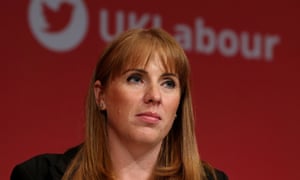
A Labour government would end the “failed free-market experiment in higher education”, taking a tougher line on vice-chancellors’ pay and improving academic diversity, the shadow education secretary is set to announce.
Angela Rayner will outline a series of major policy steps that would allow regulators to intervene in how universities in England are run, including how they recruit and reward staff.
Speaking to the University and College Union (UCU) conference on Saturday, Rayner will say: “The Tories’ obsession with free-market dogma has gone too far. Education is a public good and should be treated as such. Our universities are there for all of us.”
Under Labour the Office for Students (OfS) would see its role heavily revised, repealing the legislation that forces it to promote competition and replacing it with a new requirement for cooperation between institutions.
Rayner will also unveil a new policy to improve the ethnic diversity of staff in higher education, with the reformed regulator given specific powers to address inequality as part of Labour’s plans for a national education service.
“Like much of our establishment, our universities are too male, pale and stale and do not represent the communities that they serve or modern Britain,” Rayner will say.
“Women and staff from ethnic minority backgrounds are chronically under-represented across these institutions, and in particular at the most senior levels.
“Universities must do much more, and under Labour they will be held to account.”
The regulator would be required to enforce a commitment to a 20:1 pay ratio between the highest and lowest paid members of staff in universities, while vice-chancellors would be barred from sitting on the committees that set their pay.
Sources say that Labour hasn’t ruled out scrapping the OfS and replacing it if the regulator is unable to adapt, with Rayner saying that the OfS is “not fit for purpose”.
Rayner’s speech will also take aim at statements by the higher education minister Chris Skidmore, who said some institutions “may exit the market altogether as a result of strong competition” and that increased choice for students “does not equate to propping up any particular failing HE provider”.
In the past year a number of universities have announced multi-million pound deficits and are having to cut budgets and staff as a result of the cut-throat competition for students.
“These are not profit-making private companies that can simply be left at the mercy of market forces. Ministers cannot simply bury their heads in the sand when we’re faced with losing some of these vital institutions,” Rayner is to say.
“Students would be left with immense uncertainty about their futures and entire communities would lose one of their major academic, economic, and social institutions in the event of bankruptcy.”
Under Labour the regulator would be set an explicit objective to avoid the bankruptcy of any higher education provider in England, and given powers to make emergency loans and replace senior management in the event of severe difficulties.
Matt Waddup, the UCU’s head of policy, said: “Angela Rayner is right to highlight the damage that this government’s marketisation agenda is doing to further and higher education.
“While students and staff are central to the social and economic future of this country, their views are habitually ignored by both ministers and the OfS.”
Labour’s stance means the OfS may have a relatively short lifespan, having only come into existence last year. Its first days were beset by difficulty, thanks to the controversy over Toby Young’s appointment to its board, and it has been slow to fulfil some of its key obligations.
In response, Skidmore said: “I’ve yet to find a vice-chancellor who supports Labour’s plans to damage the sector and roll back progress that has been made in recent years.
“Under the Conservatives there are more 18-year-olds in higher education than ever before, including more students from disadvantaged backgrounds being the first in their family to go to university.”
[“source=theguardian”]
 Techosta Where Tech Starts From
Techosta Where Tech Starts From